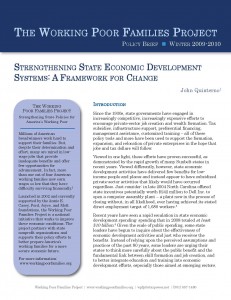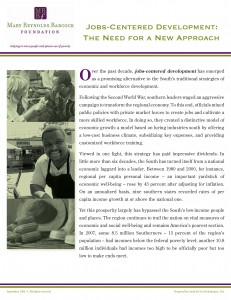Our Projects
11.05.2010
Our Projects
In late 2009 and early 2010, South by North Strategies, Ltd. conducted a review of “demand-driven” workforce development models for the N.C. Rural Economic Development Center. This research was part of the Rural Center’s “Rural Community Mobilization Project,” which is funded by federal recovery funds provided through the state Department of Commerce.
The project’s purpose was to help selected rural communities use demand-driven workforce development practices to respond to the recession. To that end, the Rural Center asked South by North Strategies to review existing demand-driven development practices in North Carolina and consult with key practitioners. Specifically, South by North Strategies considered the current economic context, critiqued the demand-driven workforce development model, profiled several promising strategies, and identified key lessons.
02.04.2010
Our Projects, Policy Points
 Recent years have seen a rapid escalation in state economic development spending: spending that in 2008 totaled at least $10 billion. Given the scale of public spending, some state leaders have begun to inquire about the effectiveness of economic development activities and just who receives the benefits. Instead of relying upon old assumptions, some leaders are urging their states to think more carefully about the public benefit and the fundamental link between skill formation and job creation.
Recent years have seen a rapid escalation in state economic development spending: spending that in 2008 totaled at least $10 billion. Given the scale of public spending, some state leaders have begun to inquire about the effectiveness of economic development activities and just who receives the benefits. Instead of relying upon old assumptions, some leaders are urging their states to think more carefully about the public benefit and the fundamental link between skill formation and job creation.
To encourage this transition, The Working Poor Families Project, a national initiative to strengthen state policies and programs, asked South by North Strategies, Ltd to identify promising ways of better orienting state economic development systems around an education and skills agenda that reflects the economic needs of low income families. The report, entitled Strengthening State Economic Development Systems: A Framework for Change is available through the project’s web site.
19.11.2009
Our Projects
To document the policy successes achieved by its 25 state partners, The Working Poor Families Project (WPFP) retained South by North Strategies, Ltd. to write and design a report documenting accomplishments between 2002 and 2009.
 Entitled Building a Foundation for Family Economic Success, the report found that the WPFP’s state partners have helped generate or preserve over $2.5 billion in state investments in low-income working families. In the process, these organizations have brought the concerns of low-income working families into an array of policy debates.
Entitled Building a Foundation for Family Economic Success, the report found that the WPFP’s state partners have helped generate or preserve over $2.5 billion in state investments in low-income working families. In the process, these organizations have brought the concerns of low-income working families into an array of policy debates.
The WPFP is a national initiative to strengthen state policies and programs influencing the advancement of low-income working families. Specifically, the WPFP strives to shape state policies related to postsecondary education and training for adults, economic development practices, and work supports and social insurance.
By describing the WPFP’s distinctive process of policy change, the new report shows how the WPFP positions state-based nonprofit organizations to champion investments in working families. Consequently, low-income working families in many states are better able to obtain financial aid, increase their education and skills, access good jobs, and make ends meet.
Click here to view a webcast in which the report’s findings are discussed.
02.10.2009
Our Projects
In 2009, South by North Strategies conducted a comprehensive review of the changes in state-level economic and workforce policies and practices that have occurred in the American South since the mid-1990s.
 Commissioned by The Mary Reynolds Babcock Foundation in Winston-Salem, NC, the resulting study traced the evolution of “jobs-centered development.” This model strives to combine the traditional tools of economic and workforce development in ways that better cultivate the skilled workforces demanded by local businesses and expand the opportunities available to local residents, especially low-income ones.
Commissioned by The Mary Reynolds Babcock Foundation in Winston-Salem, NC, the resulting study traced the evolution of “jobs-centered development.” This model strives to combine the traditional tools of economic and workforce development in ways that better cultivate the skilled workforces demanded by local businesses and expand the opportunities available to local residents, especially low-income ones.
The full study, entitled When Any Job Isn’t Enough: Jobs Centered Development in the American South, documented the need for a new development approach, traced the rise of current innovative practices, identified the building blocks of jobs-centered development, critiques popular strategies, and identified lessons applicable in recessionary times.
Click to view an executive summary of the report.
01.10.2009
Our Projects
As part of the Connected by 25 initiative occurring in North Carolina’s Research Triangle, South by North Strategies analyzed the economic and social characteristics of young adults (ages 15-24) at risk of not making a successful transition to adulthood.
Using publicly available data sources, South by North built a framework of indicators comprised of demographic, health, criminal and juvenile justice, employment, income, and educational indicators. Data were assembled for the eight counties that constitute North Carolina’s Research Triangle. Indicators for Durham County received a second, more in-depth analysis, and for that county, the share of the youth population at high risk for disconnection was calculated.
The research was commissioned by MDC, Inc. in Chapel Hill, NC, as part of work supported by the North Carolina GlaxoSmithKline Foundation based in Research Triangle Park, NC.
As part of the Connected by 25 initiative occurring in North Carolina’s Research Triangle, South by North Strategies analyzed the economic and social characteristics of young adults (ages 15-24) at risk of not making a successful transition to adulthood.
Using census and other public data sources, South by North Strategies built a framework of demographic, health, criminal and juvenile justice, employment, income, and educational indicators. The data provided the foundation for the 2008 report Disconnected Youth in the Research Triangle Region: An Ominous Problem Hidden in Plain Sight.
Data were assembled for the eight counties that constitute North Carolina’s Research Triangle. Indicators for Durham County received a second, more in-depth analysis, and for that county, the share of the youth population at high risk for disconnection was calculated.
The research was commissioned by MDC, Inc. in Chapel Hill, NC, as part of work supported by the North Carolina GlaxoSmithKline Foundation based in Research Triangle Park, NC.




 Email Sign-Up
Email Sign-Up RSS Feed
RSS Feed